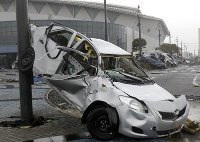Problems of Japanese car industry to affect everyone
 The earthquake in Japan has affected all areas of the country's life. The largest corporations Toyota Motor and Honda Motor have suspended production at their plants. Because of this forced action the supplies to the U.S. of Toyota Yaris, Scion XD, Scion XB and the Honda Fit / Jazz will be temporarily suspended. Nissan and Subaru have also suspended work at their plants.
The earthquake in Japan has affected all areas of the country's life. The largest corporations Toyota Motor and Honda Motor have suspended production at their plants. Because of this forced action the supplies to the U.S. of Toyota Yaris, Scion XD, Scion XB and the Honda Fit / Jazz will be temporarily suspended. Nissan and Subaru have also suspended work at their plants.
On March 11, an 8.9 earthquake that caused the tsunami ten meters high has struck the northeast coast of Japan. To date, 2,475 people have been killed, 3,611 are considered missing. Toyota has been forced to evacuate workers from several factories located in the earthquake zone. According to Autonews, two factories of the corporation that manufacture automotive components as well as two joint ventures that collect compact cars are located in the area.
Honda has also closed two assembly plants in central Japan. Nissan that was originally planning to stop only three of its plants has stopped all four of them. It was followed by Mazda, Subaru and Mitsubishi who have closed their plants as well. There is no information on when the lines will start working as the launch date is constantly changing. Automakers claim that the temporary suspension of the production at the factories is due to post-earthquake challenges in the supply of automotive components.
It is not ruled out that the lack of spare parts will be reflected in the other assembly plants, in particular in Russia, says Cars.ru. So far analysts do not expect serious problems in Russia. According to an expert of Investcafe Maxim Lobada, the car market of the Russian Federation has not been significantly affected. In 2010, car sales in Russia have grown 30% to 1,900,000 units. The current projections indicate that the market can only show the same impressive results in 2011. The growth within 20% is possible, to 2.3 million vehicles, although the sales may be affected by deterioration in global conditions, including those associated with the Japanese earthquake.
Lobada noted that the natural disaster has seriously damaged not only the production on the islands, but also destroyed the logistics infrastructure of the Japanese automobile industry. The consequence may include shortages of supply of automotive components, including to the Russian production sites of Nissan (AvtoVAZ) and Toyota. Since the other Japanese carmakers (Mazda, Honda, Subaru, and Isuzu) do not have such a large market share as the first two, they do not have a material impact on sales.
"The question regarding clunkers utilization programs and future results of AvtoVAZ should be considered in conjunction with each other. The reason is simple: AvtoVAZ has become the main beneficiary of the program and has managed to break into the leaders in sales solely because of it. Upon the completion of the program AvtoVAZ sales will go down substantially because at least one-third of the sales was due to the certificates issued in 2010.
Given the impact on the Japanese side of the alliance AvtoVAZ-Renault-Nissan caused by the earthquake in Japan, negative effects for the Russian auto giant have considerably increased. However, some of this negativity can be compensated by Reno. Since the project of AvtoVAZ and Renault-Nissan is a strategic one and is personally supervised by senior officials of the country, I believe that the government will provide all possible support to the company, regardless of what happens in the markets. I do not even rule out another extension of the recycling program and injection of additional certificates into the market.
The rising oil prices will contribute to this, which will provide an additional source of revenue for the budget and enable the government to increase the subsidy program, including those related to the automobile industry. The program for utilization of trucks that is being currently discussed should be also mentioned here. If it is implemented, there will be definitely interest in it. However, the interest will not be as strong as it was in the passenger segment. Much will depend on the specific parameters of the program. First, truck and bus fleet is in another price category. Secondly, the share of private vehicles in this segment is significantly lower than in the passenger or light commercial segments. Nevertheless, the program will significantly upgrade the country's fleet of vehicles, which can only be welcomed.
In general, I believe that in 2011 the main growth in sales of passenger cars will be observed in low-and a mainstream segment. The demand for premium and luxury cars has been traditionally less elastic from an economic point of view. The sharp rise in demand for cars in this class is only possible with a sharp increase of the people's wealth, which I do not expect at the moment. While the overall trend will gradually move from low-budget cars to the middle class ones, this is the prospect for 2012-2013. By that time AvtoVAZ will simply withdraw the models it currently sells from the production line and replace them with more modern cars on the technological base of Renault and Nissan," the expert believes.
Artem Cherniavsky
Bigness
Subscribe to Pravda.Ru Telegram channel, Facebook, RSS!





